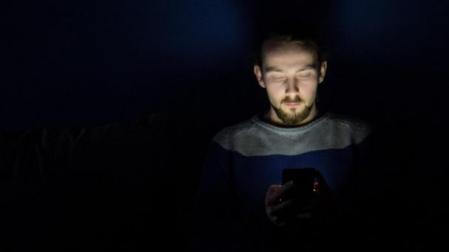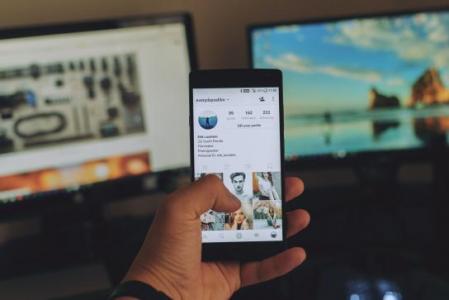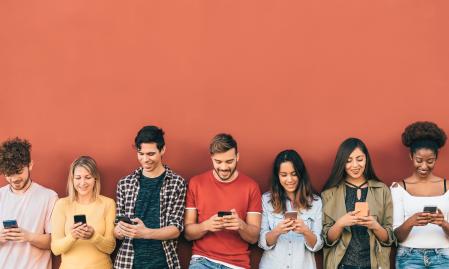When we interact with other people, we always run the risk of doing something disrespectful without realizing it. The situation that we present below may be familiar to you.
You are having coffee with a friend and suddenly you receive a notification on your mobile. While the other is talking to you, you pick up the phone, look at the notification and even reply to the message. Your friend is talking to you and you haven’t been paying attention for half a minute because you’ve decided to interact with your mobile. This is called phubbing.
The coordinating researcher of the UOC’s Behavior Design Lab, psychologist Manuel Armayones, is the author of the book The Smartphone Effect and is fully aware of the benefits and risks of using mobile phones. He describes phubbing as “the phenomenon that occurs when a person stops paying attention to the immediate environment or to the person with whom he is speaking to pay attention to his mobile phone.”
If it is notified before, nothing happens

Looking at the mobile ignoring others is phubbing
CC0
The expert understands and recognizes that there are times when what comes to us by mobile phone is really urgent, it is a work commitment or it is a communication that we have to attend to out of necessity. In these cases, Armayones explains that, instead of pretending that you are listening –when, in fact, you have disconnected–, it is better to warn and explain it.
Also read WRITING

“When there were no smartphones and we went with phones that only called, you could tell someone Look, I’m waiting to receive an important call. Don’t be offended, but I’ll have to pick it up, and the other person understood it perfectly,” he explains. “Now we can do the same and notify, or excuse ourselves for a moment to attend to something important, but often we forget to do it”, and we accidentally get distracted by the screen.
‘Phubbing’ as a shield for not relating

Looking at notifications is like a reward
CC0
Manuel Armayones adds that many people use phubbing socially to avoid having to interact with other people. “Getting hooked on the mobile when you enter a place where there are people, in many cases is marked by the desire not to open the door to any contact,” he explains. “It serves to isolate us because we feel more comfortable with a communication that we control, than with a face-to-face conversation.”
The interviewee advises that, if we have to meet someone with whom we will speak face to face, we deactivate the notifications of the mobile or, directly, we put it in airplane mode. “You’ll see how nothing happens,” she says. And if you expect a call or some important notification, he warns you before you might have to answer, so that the other person is careful and doesn’t get offended. She will understand.
Bad Education
As a most graphic example, the expert invites us to imagine what would happen if we met someone who, just starting the conversation, opened the newspaper or a book and started reading it. Surely we would attract your attention.
Read also Antonio Ortí

“Well, it’s the same with the mobile. What happens is that we are still adjusting to the social uses of these tools, we have not yet passed this subject,” says Armayones, who also gives the example of the typical “mobile moment” that It occurs at all dinners with friends, in which one of the diners takes out his cell phone and, by social convention, gives non-verbal permission for the others to do it too and see if everything is in order on his device.
Is it a symptom of mobile addiction?

When one takes out the mobile, others follow him
Getty Images/iStockphoto
Although it is true that many people make abusive use of the telephone wherever they go, the fact of phubbing someone as an isolated phenomenon could not be considered a warning sign to seek professional attention for addiction. It would be more of a habit, understood as an automatic action without realizing it and that gives us pleasure.
The expert would consider it more a result of the technological persuasion exerted by mobile phones towards users and the reward in the form of dopamine that they produce when we know that we have a notification and satisfy our need to know the content of the message.
Also read estela26

“When we receive a notification, it is very difficult not to look at the mobile, it is designed for this. And when you do, you feel a great relief, a satisfaction for having overcome the uncertainty,” he describes. “It’s like a slot machine, in that you don’t know the prize that each of the notifications can give you – in the form of a like, a comment, a love message, etc.-“.
Despite being just a habit, it can have significant repercussions in our day to day. “Getting past your kids because you’re looking at your phone is not good for children’s development,” he says. “You can’t generalize, but there are parents who don’t dedicate the time that they should dedicate to their children in their stage of physical and cognitive development. If you phubbing them, it is not the most positive thing.”
And in the same way that phubbing is done to people, it is also done to pets when we take them out for a walk, and even on the road, when we do not give it the attention and concentration it deserves because we are using our mobile phones while driving. .
In addition to mobile phones, more and more people are using a smart watch that sends notifications and content to your wrist. This helps us because we don’t have to take out the phone, but Armayones assures that it is not an aid, but a facilitation of the problem, which in no case disappears. When we receive a notification on the watch, the effect will be the same. “In addition, the vibration it produces makes it even more inevitable for us to look at it, because it is an easier gesture”, which will prompt us to attend to the notification and phubbing our physical interlocutor even more.


